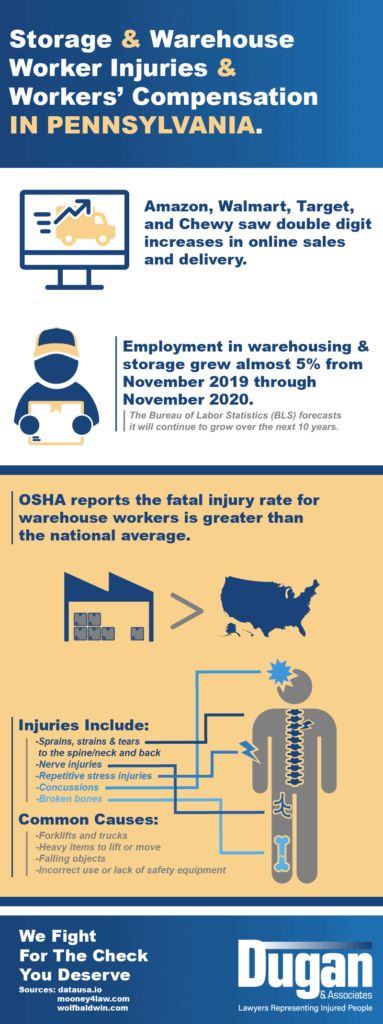

Online ordering and home delivery skyrocketed this past year during COVID-19. Amazon, Walmart, Target, and Chewy all saw double digit increases in online sales and delivery. This trend also created a demand for warehousing and storage. Employment in warehousing and storage grew almost 5% year-over-year from November 2019 through November 2020, and the Bureau of Labor Statistics (BLS) forecasts it will continue to grow over the next 10-years. Unfortunately, warehouse injury statistics in Pennsylvania also increased, rising 44% between 2018 and 2019. As the industry grows, we sincerely hope the injury rate declines; however, we’re here to help those who are injured while working in warehousing and storage.
The physical demands and fast-paced environment of warehouse and storage jobs can create a number of safety hazards for employees. Common causes of accidents include:
Warehouse Injuries can arise from inadequate training, overexertion, disregarding safety protocols, dangerous or crowded work environments, and damaged equipment. It is important to always wear necessary protective gear and exert additional caution around high-risk areas such as loading docks.
Workplace injuries may occur immediately caused by a specific event (such as an object falling) or over a period of time (such as hearing loss). Common warehouse injuries include:
In severe cases, accidents can result in organ damage, paralysis, brain injury, and death. The Occupational Safety and Health Administration (OSHA) reports that the fatal injury rate for warehouse workers is greater than the national average. According to the BLS, a total of 5,333 fatal work injuries occurred in 2019, a 2% increase from 2018. Almost 1/5 of deaths were driver/sales workers and truck drivers.
Warehouse workers are not independent contractors. As employees, they are entitled to workers’ compensation for injuries incurred while on the job. Companies who contract out jobs to temporary staffing agencies are still responsible for their workers and any accidents that occur. Regardless of how long an individual worked at a particular job, they are entitled to compensation for a work-related injury. Not all employers are knowledgeable about Pennsylvania workers’ laws. Worse, they may deliberately try to subvert the system by misclassifying their employees as independent contractors.
The pandemic changed the way consumers shop, skyrocketing the popularity of online shopping services. Unfortunately, this increase in demand may cause a similar increase in warehouse injuries. The Center for Investigative Reporting notes that injury rates at Amazon facilities are higher than the industry average, largely due to the fast-paced environment of using robotic assistance. Workplace regulators in Washington state proposed a new workplace classification specifically for Amazon facilities - “fulfillment center.” The new category would increase workers’ compensation costs by 15%. If passed, this change might carry over to the many Amazon operations throughout Pennsylvania.
Warehouse workers’ compensation claims can be complex, and it is important to have a knowledgeable lawyer there to guide you. If you or a loved one were injured while working as a warehouse or storage worker, contact Dugan & Associates. Click to contact us or call us at 412-353-3572. We will work hard for you, pursuing fair and just compensation and getting you the treatment you or your loved one deserve.
"*" indicates required fields